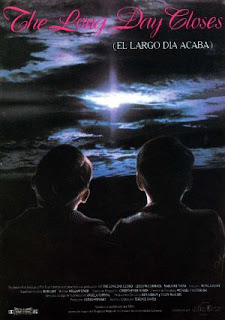 After I was underwhelmed and unaffected by Terrence Davies’ assured debut feature Distant Voices, Still Lives earlier in the week, I was looking forward to this follow-up and thematic sequel. I’d heard that this was a maturation of Distant Voices and I anticipated connecting with this more since it was focusing on one subject, and since that subject was representing Davies himself. Having seen it now, I agree that it shows Davies maturing and developing his style and storytelling further, but I was even less emotionally engaged in it than I was with his debut. I was even annoyed with myself and the film that I cared so little for the characters, because everything in this film is so well done that I don’t see how I could have had such an empty response to it, especially while everyone around me in the theatre was sniffling and wiping their cheeks.
After I was underwhelmed and unaffected by Terrence Davies’ assured debut feature Distant Voices, Still Lives earlier in the week, I was looking forward to this follow-up and thematic sequel. I’d heard that this was a maturation of Distant Voices and I anticipated connecting with this more since it was focusing on one subject, and since that subject was representing Davies himself. Having seen it now, I agree that it shows Davies maturing and developing his style and storytelling further, but I was even less emotionally engaged in it than I was with his debut. I was even annoyed with myself and the film that I cared so little for the characters, because everything in this film is so well done that I don’t see how I could have had such an empty response to it, especially while everyone around me in the theatre was sniffling and wiping their cheeks.
The films opens similarly to Distant Voices, with the camera roaming the street and then wandering into the doorway in which the boy and his family live (which I think is the same house that the family lived in in Distant Voices; the entry and stairs look the same, anyway). From here, The Long Day Closes evolves in a similar manner as Distant Voices does. The film is mostly made up of small scenes to get prescription drugs without a prescription that sort of work on their own, but aren’t designed to progress from one to another. We see Bud, the protagonist, pensively stare out the window at shirtless workers, get bullied at school, bashfully strip to go swimming, and interact with his family. Davies limited the sing-alongs a bit more here, but there are still more than I would have liked. While I was trying to find something in the film to grab ahold of and care about, I was instead given singing. Unlike in a musical, though, the singing and lyrics don’t progress the plot, nor do they introduce ideas or develop the characters; they just took up time that I’d rather have had with Bud and his mother and brothers. Which I think is the main issue I have with Davies’ films, is that I think he is more interested in these romantic depictions of memories, portraying them beautifully, set to wonderful music than letting the viewer know what these memories mean to him. I honestly cannot tell if he is showing memories that he is fond of, memories he wishes he could forget, both, neither, or something else. For all I could tell, he was picking memories that would look the best in the film, like the closing shot of the sunset (pictured in the poster above). While gorgeous to look at, I wasn’t nearly as entranced by it as I was by a similar shot at the end of Silent Light. But it had every right to be just as good as, and better than, that shot. But like the rest of the film, it just happened, and meant nothing to me.
